Artistic Motivations: Acrylics Drawings Painting Seagulls Water
by David Jay Spyker
leave a comment
Gulls
Much like I’ve used boats and houses as metaphor for humanity, I’ve come to include seagulls as well. If you watch a large flock, you start to see how their society is arranged with its own hierarchies. You’ll notice the greedy squabbles, the games they play on a breezy summer day, and the clear – sometimes vicious – pecking order there is within the flock.
Amputee is a portrait of one particular gull I saw regularly at the north beach in South Haven. It had lost a foot to fishing line but in spite of the difficulty of landings and take-offs, it kept on going.
When I’d feed the flock there, this one was always at the front, and the others would give it a wide berth. It had a bit of a cantankerous spirit. People don’t always notice the missing foot right away, but when they read the title it clicks. There is a real expression of the tenacity of life here, and I’ve tried to capture that in the way the gull stares back with directness and defiance.
I’m a night owl, and to me the gull in this small piece (only 5 x 7 inches) looks like how I feel if I get up early in the morning, so I titled it “Self-Portrait in the Morning as a Gull”.
It’s amazing how quickly a hundred or more gulls will show up if you start tossing out bread or french fries. In “Compass” I wanted to record that experience. When you feed them, you’ll end up with two groups: one with the more timid gulls on the ground, the shyest standing farther away, and the second group flying in to catch thrown food mid-air.
The fliers have this regular routine where they form a sort of queue and work their way to within about a foot, then they hover there as long as possible. Occasionally the second gull in line will give the first an impatient peck in the back. They’ll look you right in the eye; it’s an intense, piercing sort of stare.
You can toss them food and the lead gull will catch it. If you hold up a fry, one will snatch it right from your fingers – their instinct to keep a safe distance gets put aside for their greed for food. Then it will veer off to eat mid-air while it circles around to the back of the line. They’ll just keep this up, cycling around and around, until you run out of food.
The title refers to the regular circling pattern, as well as the keen sense of direction that birds possess. I suppose it also speaks to the circular patterns of life.
To the right is another small one – 8 x 6 inches. I wanted to capture a particular quiet stare, and when it was finished I felt an odd personal connection, so it ended up getting the title “Baroque Self-Portrait as a Seagull”. The dark background and the lighting help reinforce the sense of a traditional baroque portrait.
In “Startled Gull”, I wanted to capture a sense of movement along the wings while retaining a stillness around the head and body, so I used quick finger smudges along the back edge of the lower wing.
“Sudden Flight” depicts the same seagull startled by waves of water jetting up along a soaked pier in South Haven, Michigan. There is something fleeting and fragile about life with the chaotic frenzy of the water crashing up behind the gull. It seemed so small and at the mercy of the greater power of nature – so transitory.
Click here to read a previous article about “Sudden Flight”.
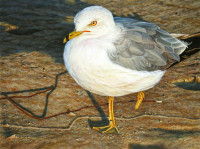
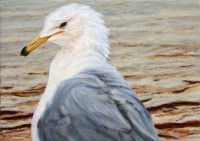
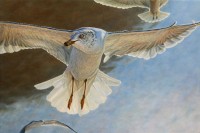
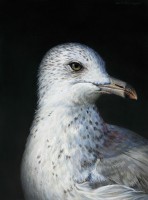
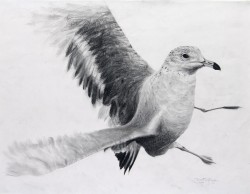
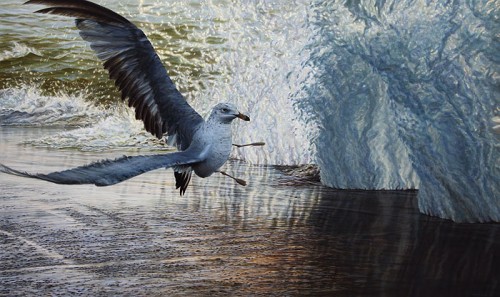
Leave a Reply